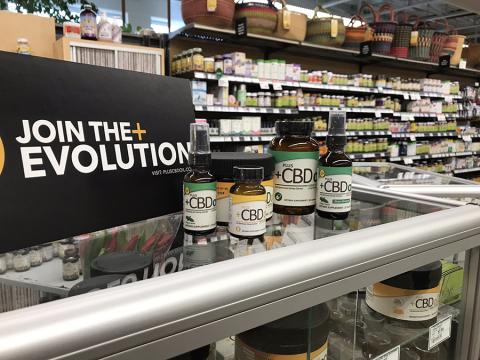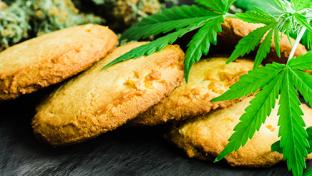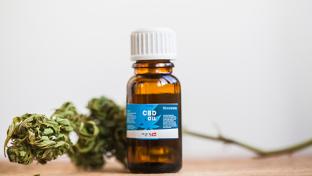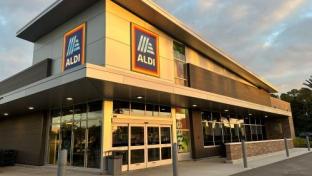CBD Products Are Coming to Grocery – Now What?

Whole Foods Market co-founder John Mackey recently told an audience that “chances were good” that the Austin, Texas-based chain would sell cannabis in its stores located in states where the sale of the substance was legal. “You just never know what happens over time with markets,” he said. “They change and evolve.”
Mackey would be ahead of the pack on that decision — mainstream supermarkets aren’t likely to sell cannabis anytime soon. But there has been a surge of interest among retailers in products that contain cannabidiol (CBD), a naturally occurring cannabinoid compound found in marijuana and hemp plants that is non-psychoactive.
The U.S. federal government continues to classify marijuana as a Schedule I controlled substance; however, the 2018 Farm Bill removed hemp and hemp-derived CBD from this restriction, formally making it an agricultural commodity, which enables major U.S. retailers to start selling some CBD products from hemp, with no legal risk. Cannabis industry analysts at The Brightfield Group, based in Chicago, predict that the U.S. hemp-derived CBD market will reach $591 million this year and $22 billion by 2022.
CBD for Health
More CBD-infused products are entering the market, particularly in health-and-wellness product categories. Consumers are increasingly looking for natural alternatives to traditional OTC/HBC products, and CBD-infused products could answer that need: The “Cannabis Study,” from New York-based MRI-Simmons, found that 43 percent of people surveyed said that they prefer alternative medicine to traditional medical practices.
Further, a recent study from The Hartman Group, in Bellevue, Wash., suggests that with less stigma than THC and a wide variety of calming and anti-inflammatory benefits, CBD has significant potential to go mainstream as a natural remedy for a variety of common health-and-wellness issues.
“This year, for the first time in our health-and-wellness study, the No. 1 condition that people were managing was not weight, but stress and anxiety,” says Laurie Demeritt, CEO of The Hartman Group. “For day-to-day anxiety, many people don’t want to take a script, and there’s no OTC option to treat that. CBD could fill that gap.”
Nationwide drug store chains CVS, Rite Aid and Walgreens all recently revealed that they would begin selling various hemp-derived CBD health products, including creams, patches and sprays, at a collective total of more than 2,500 stores. Currently, 33 states and the District of Columbia have legalized cannabis for medical use, and among those states, 10 have legalized recreational use. Under the U.S. Food and Drug Administration’s regulations, CBD is still prohibited within food products, but the FDA is exploring how it can best regulate the compound and hemp in food and dietary supplements.
Opportunities at Grocery
“It’s inevitable that grocery will carry products infused with CBD,” says Jessica Lukas, VP of consumer insights for Boulder, Colo.-based BDS Analytics, a provider of cannabis industry market trends reports and analyses, and cannabis consumer research. “They have to keep up with their competitors.”
According to experts, topicals will likely be the first CBD-infused product category to attract major supermarket interest. “Until the FDA decides how it will regulate the products, topicals are less risky for retailers than ingestibles,” notes Dylan Summers, director of government affairs at Seattle-based Lazarus Naturals, which produces a line of CBD topicals, capsules and tinctures.
“There’s a big opportunity to reach people with topical applications who might not be willing to walk into a dispensary store,” says Lukas. “You’re not ingesting it, and there’s no concern about a psychoactive or intoxicating effect.” Lukas adds that she expects mainstream topical pain-management brands could eventually add CBD SKUs to their product lines.
Dr. Kerklaan Therapeutics, a six-SKU line of CBD topical products for pain, PMS, sleep and skin, is currently on shelves at Market of Choice, a 12-unit chain based in Eugene, Ore. The line will expand to 30 SKUs in the next few months, and has been presented to national supermarket chains. “The consumer is ready and searching for the products,” asserts Dr. Andrew Kerklaan, founder of the Berkeley, Calif.-based brand. “Now that the Farm Bill is passed, it’s full speed ahead.”
Topical CBD products are also carried at New Seasons Market, a 21-unit chain based in Portland, Ore., and New York-based Fairway Market recently launched Fairway Essential Wellness Full Spectrum Hemp Products, a line of CBD-containing items that includes balms and lotions for topical relief, as well as capsules and oils that can be ingested. Lazarus Naturals’ Summers believes that CBD tinctures, gummies and capsules will become more common in supermarkets once the FDA provides guidance on the ingredient.
- More CBD-infused products are entering the market, particularly in health-and-wellness product categories.
- Topicals rather than ingestibles are likely to be the first CBD-infused product category to attract widespread supermarket interest.
- Personal care, beverages, snacks and sweets have been identified as key categories for CBD innovation.
Further Category Disruption
In addition to OTC medications, a recent study by The Hartman Group has identified personal care, beverages, snacks and sweets as key categories poised for CBD disruption.
CBD is already emerging as an ingredient in beauty care products. Bolingbrook, Ill.-based beauty store chain Ulta recently added Cannuka’s five-product CBD skin care line in its stores and online, while Paris-based Sephora carries Lord Jones CBD-infused skin care products.
The Specialty Food Association’s Trendspotter Panel believes that edibles will continue to grow as more states legalize sales of hemp-derived CBD products. A recent study on consumer interest in food and beverages made with cannabis ingredients, from Culinary Visions, a Chicago-based culinary marketing firm, identified baked goods (48 percent), candy/gummies (45 percent), snacks (44 percent) and nonalcoholic beverages (41 percent) as top cannabis-infused categories that consumers expressed interest in trying.
SteepFuze, a brand of gourmet small-batch infused coffee and tea products, is already carried at some Lucky’s Market locations and is being evaluated for national rollout. “We are carried by 160 retailers nationwide, but being picked up by Lucky’s was a big step,” notes Devin Jamroz, CEO and co-founder of the Boulder, Colo.-based company. “The Farm Bill brought a lot of legal clarity to the category, and more buyers are looking at the products at trade shows. With every landmark we hit, another tier of stores opens up. While I wouldn’t say the floodgates are opened, interest in CBD products is spiking, and coffee is a great category for retailers who want to get into the space.”
Other CBD-infused drinks currently on the market include Recess, sparkling water infused with hemp extract and adaptogens, and Sprig CBD-infused soda.
At Willy Street Co-op, a Madison, Wis., grocery cooperative with three locations, consumers can add CBD as a nutritional supplement to beverages for $1.25 per 0.75-milliliter shot. “Our juice bar has a long history of offering supplements as additives, so it was a natural addition for us,” says GM Category Manager Angela Pohlman.
Willy Street offers several delivery systems for CBD, including CBD oil in tinctures and capsules, gummies, lozenges, vape products, chocolates, coffee, and kombucha. “We also have several topical options such as salves, lotions, oils, bath salts and even facial oils,” notes Pohlman. “Most [of our customers] are interested in taking CBD and hemp phytonutrients internally, so we’ve mostly brought in options that are consumable.” She expects to see CBD in more baked goods and other grocery items.
Merchandising CBD
Among those retailers entering the category, there’s no consensus yet on where or how to merchandise the products. Boulder-based Lucky’s merchandises SteepFuze coffee with other coffees, rather than in a CBD section with tinctures and topicals. While Lucky’s has product on shelf, fellow Boulder grocer Alfalfa’s Markets merchandises CBD oil at its two stores in a locked case. Assistance is also needed to purchase products in Fairway’s stores.
Additionally, consumer education is an issue in a new category that consumers may not be familiar with. “It’s a confusing category that requires education,” observes The Hartman Group’s Demerritt. “We see a burgeoning consumer interest in using cannabis for health-and-wellness purposes, but a hesitancy because they don’t understand the category. That’s a wide-open gap that the industry needs to step into.”
Even among cannabis users, only 36 percent are familiar with the use of CBD in various products for health and wellness. “There’s a lot of open space, and it would be beneficial for retailers and manufacturers to do more in the way of consumer education,” advises Karen Ramspacher, SVP of innovation and insights at MRI-Simmons.
Some retailers are already stepping up in that regard. “We are starting to work on more outreach and customer education surrounding CBD — we’ve got some Facebook Live events scheduled, written newsletter articles, etc.,” offers Willy Street’s Pohlman. “We do offer training to our staff as often as we can to make sure they can help guide customers, as well as offering books about CBD and vendor-provided pamphlets in store.”
Culinary Visions' study revealed that when it comes to CBD-infused products, trust and traceability were key consumer concerns. Half of those surveyed said that they’d feel more comfortable buying such products if they had the opportunity to speak with a knowledgeable sales representative
To that end, the Dr. Kerklaan brand provides online information, sampling programs and on-shelf educational information, and can customize in-store informational displays and train in-store staff about the product line. According to Dr. Andrew Kerklaan, purchasers should look for products that are U.S.A.-sourced or grown, that include information on lab tests, and that clearly state the concentration of CBD in the product and reference CBD oil or extract, not hemp seed oil, which is a low concentration of CBD.





%20teaser5e1d.jpg)

